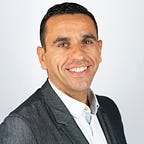The Future Of Healthcare And Its Many Challenges
“There is no turning around it. The ubiquity of wireless technology and the strong need to transform healthcare will most certainly intersect!” -(pwc).
About 10 years ago mHealth conferences were no more than a few people occasionally meeting in jeans. Now it is seen as the biggest technological breakthrough in healthcare which has the potential to solve its greatest challenges. In 2014 the number of connected gadgets was already outnumbering the amount of people in the world and from 2006 to 2012 the amount of mHealth hits on google increased with 11336.36%!!!
With its potential to decrease the excessive healthcare cost and provide proper preventive care for the increasing cases of non-communicable diseases you would say that by now mHealth should be fully integrated in healthcare by now. However… this is still not the case.
Currently mHealth is used for small improvements of existing practices. An example is the use of texting to remind patients of there appointments. These changes are beneficial however do not tackle the biggest issues. In order to put a rem on the increasing number of non-communicable diseases such as diabetes, decrease cost and better the common health, there needs to be a disruptive change and a full intergradation between mobile health devices / applications and healthcare providers and systems. This integration is facing a vast amount of challenges and will need hard work hard to overcome.
The healthcare industry is a conservative industry, entrenched and change-averse. Change goes slowly since many stakes are involved, “ the field changes by consensus precisely because if innovation does not work out as planned, the risks to human health can be substantial and difficult to foresee” -(pwc). Adding to that payers (insurers and government entities), care givers and patients all have different interest, making the issue at hand more complex.
Research shows that patients are interested in mHealth since it means lower cost, more control over their health and having the increased convenience of healthcare on demand. Doctors on the other hand like to see less administration and better care however are afraid that the increased self-control will be disadvantages for them, changing the current doctor / patient relationship. Payers are leaning moreover to the opinion of the patients. They have concerns about security and privacy, but see the long term public health advantages.
The diverse interests and the conservative industry mind are not the only challenges mHealth is facing. Strict government regulations, the self-protection of stakeholders who do not want to lose their current incentives, the lack of alignment and the out of date technology are all staling the change. One third of the public doctors surveyed states that they do not even have access to mobile internet at work…. Most national healthcare systems are vast and fragmented and the levers of change vary in each country. “Ian Leslie, Professor of Computer Science at Cambridge University and an expert in mHealth in China, notes that one strategy for mHealth entrepreneurs is, as much as possible, to “avoid interacting with the humongous thing” that is the health system.” -(pwc)
But hey… We started this by stating that the change is inevitable. But then how? And what will be needed?
For the full article, please click here
Best regards,
Joao Bocas
